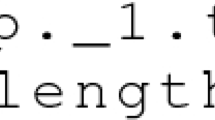Abstract
This paper discusses the development of a next-generation problem-solving language. The example language discussed represents a shift from a strong (or precise) specification language toward a weak (or imprecise) one. The shift toward a weak language introduces the problem of ambiguity in the specification. A synthesis method that handles the ambiguity for an integrated program specification is the focus of this paper. A more precise understanding of ambiguity is discussed and disambiguating heuristics for the example synthesis environment are presented.
Similar content being viewed by others
References
E. I. Oviedo, “Control flow, data flow, and program complexity”,Proc. IEEE Computer software and Applications, pp. 146–152, November 1980.
D. Cooke, “Proving properties of software design methods”,1st Int. Conf. on Software Engineering and Knowledge Engineering, Skokie, IL, pp. 9–12, June, 1989.
D. Cooke, “Towards a formalism to produce a programmer assistant CASE tool,”IEEE Trans. Knowledge Engineering and Data Engineering, vol. 2, no. 3, pp. 320–326, September 1990.
D. Cooke and A. Gates, “On the application of stratification to requirement specifications,”Proc. 2nd Int. IEEE Conf. on Tools for Artificial Intelligence, pp. 760–766, November 1990.
A. Gates and D. Cooke, “An introduction to the recognition of iterative structures by a CASE tool,”2nd Int. Conf. on Software Engineering and Knowledge Engineering, pp 202–208, June 1990.
N. Wirth, “On the design of programming languages,”Proc. IFIP Congress 74, North-Holland Publishing Co. Amsterdam, Holland, pp. 386–393, 1974.
Apt, Blair, and Walker, “Toward a theory of declarative knowledge,” in:Preprints of Workshop on Foundations of Deductive Databases and Logic Programs, 1986.
D. Cooke and A. Gates, “On the development of a method to synthesize programs from requirement specifications,”Int. J. Software Engineering and Knowledge Engineering, vol. 1, no. 1, pp. 21–38, March 1991.
M. Genesereth and N. Nilsson,Logical foundations of Artificial Intelligence, Los Altos, CA: Morgan Kaufman, 1987.
Author information
Authors and Affiliations
Rights and permissions
About this article
Cite this article
Cooke, D.E. An issue of the next generation of problem-solving environments. Journal of Systems Integration 2, 39–52 (1992). https://doi.org/10.1007/BF02265070
Received:
Revised:
Issue Date:
DOI: https://doi.org/10.1007/BF02265070




